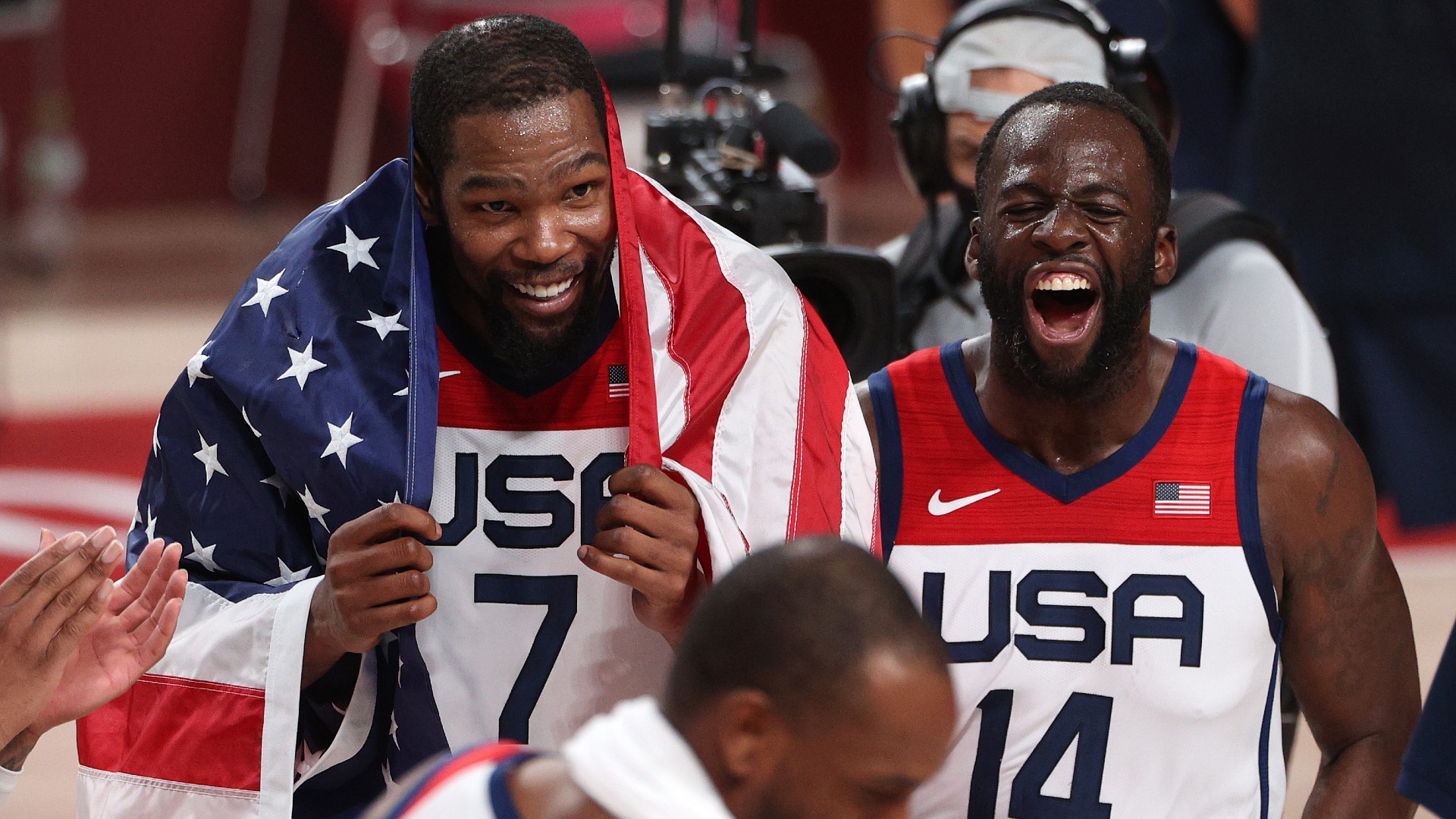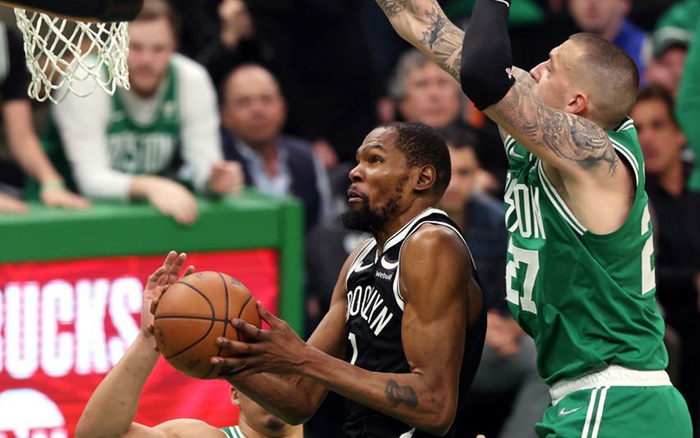
The most exciting part of a superteam is the idea of it. Before the stars take the court together for the first time, they could be anything—incredible talents maxed out by their new, supercharged circumstances, overqualified facilitators sacrificing vanity stats for the sake of the team, or radical reimaginings of everything we thought we knew about some of the best players in the sport. The reality of those teams is often more complicated and, in the case of the Brooklyn Nets, outright implosive. But while the ball still hangs in the air, a superteam is pure possibility.
/cdn.vox-cdn.com/uploads/chorus_image/image/71959012/KDSuns_Getty_Ringer.0.jpg)
The formation of a team like that can make Patrick Beverley jump on a table in an Italian restaurant. It can lead LeBron James to make some wildly irresponsible promises at a preseason pep rally. For that matter: It can inspire a professional basketball team to host a preseason pep rally. This is, spiritually speaking, where we now find the Phoenix Suns—who reportedly struck a trade overnight to acquire Kevin Durant (along with T.J. Warren) in exchange for Mikal Bridges, Cam Johnson, Jae Crowder, and a bevy of future picks.
This move completely resets the expectations for the Suns, who had faltered to a middling seed in the West, and allows them to think so much bigger. Durant is really the ultimate in superteam dreamscaping, for the simple reason that his game is as adaptable as it is undeniable. Any team in basketball could fit one of the most reliable scorers in the history of the game into the complexion of what it does. Phoenix gave up a nice haul for the privilege and, in doing so, centered its contending run around the core of KD, Devin Booker, Chris Paul, and Deandre Ayton. There are questions beyond them—regarding depth and defense, for starters—but there are also virtual certainties. Phoenix will be almost impossible to stop. That’s generally the case for any team anchored by Durant, but particularly for one that already has so much infrastructure in place to support the ways Durant likes to operate.
So many of Phoenix’s go-to sets for Booker—curls that have Booker run off screens to catch the ball when he already has a step on his defender—could be easily transposed for Durant, who can do most everything Booker can, only at more extreme dimensions. That’s where things get dangerous. The Suns already know how to set up a deadly pull-up shooter with enough space and momentum to work out the best of his options. Now they plug the most unguardable pull-up shooter of all time into that framework—despite the fact that Durant honestly doesn’t even need much space or momentum—without even having to surrender Booker in the deal.
The Suns have learned many hard lessons—among them the limitations of a well-designed system—these last few seasons, and in this season in particular. At its best, Phoenix has been as fluid as any team working these past few years. Every action has fed into some equal and complementary reaction; they take some small advantage Paul created and build on it with read after read until it nets a quality shot. There were no definite end points—only options upon options. When Booker was sidelined by a groin injury, however, the Suns learned how little they can rely on all that cute action without the threat of a fallback scorer. Opponents lived with letting Bridges create or Ayton try to make something happen. They let the ball find Josh Okogie, Ish Wainright, or Jock Landale out on the perimeter, and gently encouraged them to shoot. A beautiful offense turned into a well-meaning team just spinning its wheels.
Durant doesn’t just rectify that issue—he changes every proposition involved in attempting to guard the Suns in the first place. All of those well-rehearsed actions and sets will be flanked by one of the game’s greatest shooters. They will flow through a 7-footer who can break down his matchup at any time and in any way. They will explode with potential at the very idea that the ball could swing to Durant, all but forcing opponents to scramble and overreact in response. From this day forward, Phoenix has the option to strip down its approach whenever it wants. Feeding Durant in isolation remains one of the most straightforward paths to quality offense anywhere in the league. Yet the real boon—as the Warriors found out years ago—is the transcendent lift a motion offense gets just from having Durant in the flow.
/cdn.vox-cdn.com/uploads/chorus_image/image/70778143/1240120789.0.jpg)
It won’t even take all that much imagination from Phoenix’s coaching staff for this revamped group to reach those heights. Durant will do more for the Suns than Bridges or Johnson ever could while ostensibly filling the same positions. That’s a change, in a mechanical sense, but not much of a departure when the spacing and patterns of movement to maximize Durant are already baked into the offense to begin with. As superteams go, it’s hard to imagine a star with a lower-maintenance playing style than Durant, or a fit that could accommodate him as organically as Phoenix’s. One of the most midrange-heavy offenses in the NBA just picked up the league’s preeminent midrange shooter. It’s a brutal turn of events for teams like Denver and Memphis, who have to contend with not only another elite player on their side of the playoff bracket, but one they aren’t all that equipped to guard.
With Durant, Phoenix has the makings of a championship favorite. Yet before we skip straight ahead to the postseason, the Suns will be put to the test through the rigors of months of actual basketball. There’s everything Phoenix could be, and there’s everything Phoenix is now—with Booker easing his way back from a groin injury, Durant still out nursing an MCL sprain, and Paul, 37, an ongoing project of injury management.

Each of those stars should ease the physical burdens on the others, buying them time in recovery and lightening their workload from night to night. Yet in their circumstances, we can see the inconveniently practical realities of this kind of superteam bargain. It’s not always about whether everybody gets along, or how a trio of stars accustomed to huge roles will share a single ball. It’s not usually even about who gets what shots or fills which positions. Durant sprained his knee, and a resurgent Nets team completely fell apart. The Nets fell apart, and Durant became a Sun. It’s a special kind of business, stacking stars on stars, but even extraordinarily talented teams can rise and fall based on the most ordinary developments.

